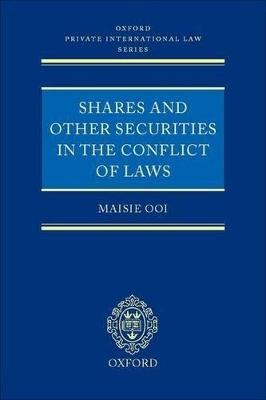
Shares and Other Securities in the Conflict of Laws
Seiten
2003
Oxford University Press (Verlag)
978-0-19-925613-6 (ISBN)
Oxford University Press (Verlag)
978-0-19-925613-6 (ISBN)
Examines the problems of choice of law where transactions cross borders and involve shares or other securities of different nationalities. This book considers dealings in securities under the traditional direct holding system and under the modern system of holding through intermediaries.
This book examines the problems of choice of law relating to shares and other securities. It is a subject that occupied a fairly obscure corner of conflict of laws until the impetus given to it by Macmillan v Bishopsgate Investment Trust (No 3) and recent interest generated by fears within the international financial community that the conflicts problems arising from the modern system of securities holding through intermediaries threatens the system's viability. At both European and international levels, efforts have been made to legislate for certainty in an area of the greatest practical importance to the major players in the capital markets, as the value of cross-border transactions in such securities runs into billions of pounds daily.
Shares and Other Securities in the Conflict of Laws is divided into two parts. Part I determines the present state of English law with respect to choice of law treatment of dealings in shares, and examines the basic rules involved. It considers the context in which the rules have evolved, the situations in which they are said to apply and have been applied, and the place of the rules in the conflicts treatment of securities transactions today. The main focus is on dealings with shares in the traditional direct holding system from which the basic rules developed.
Part II considers the difficulties associated with the application and extension of the basic rules to the choice of law issues that arise in the indirect holding system, the various theories and legislative reforms (of the EU and at the Hague) that have been suggested in respect to their resolution, and the extent to which they provide a viable solution. Comparison is also made with the related law reform initiatives in the US of Revised Articles 8 and 9 of the Uniform Commercial Code. The book concludes with an examination of special choice of law concerns in insolvency and arising from collateralization (such as perfection and recharacterization), the impact of dematerialization and immobilization on shares, and the choice of law problems posed by them.
This book examines the problems of choice of law relating to shares and other securities. It is a subject that occupied a fairly obscure corner of conflict of laws until the impetus given to it by Macmillan v Bishopsgate Investment Trust (No 3) and recent interest generated by fears within the international financial community that the conflicts problems arising from the modern system of securities holding through intermediaries threatens the system's viability. At both European and international levels, efforts have been made to legislate for certainty in an area of the greatest practical importance to the major players in the capital markets, as the value of cross-border transactions in such securities runs into billions of pounds daily.
Shares and Other Securities in the Conflict of Laws is divided into two parts. Part I determines the present state of English law with respect to choice of law treatment of dealings in shares, and examines the basic rules involved. It considers the context in which the rules have evolved, the situations in which they are said to apply and have been applied, and the place of the rules in the conflicts treatment of securities transactions today. The main focus is on dealings with shares in the traditional direct holding system from which the basic rules developed.
Part II considers the difficulties associated with the application and extension of the basic rules to the choice of law issues that arise in the indirect holding system, the various theories and legislative reforms (of the EU and at the Hague) that have been suggested in respect to their resolution, and the extent to which they provide a viable solution. Comparison is also made with the related law reform initiatives in the US of Revised Articles 8 and 9 of the Uniform Commercial Code. The book concludes with an examination of special choice of law concerns in insolvency and arising from collateralization (such as perfection and recharacterization), the impact of dematerialization and immobilization on shares, and the choice of law problems posed by them.
Dr Maisie Ooi was educated at the University of Malaya and the University of Oxford, and was awarded her DPhil in 2001. She is Senior Associate with the international law firm Freshfields Bruckhaus Deringer in Hong Kong.
PART I ; PART II ; PART III
| Erscheint lt. Verlag | 20.3.2003 |
|---|---|
| Reihe/Serie | Oxford Private International Law Series |
| Zusatzinfo | numerous figures and tables |
| Verlagsort | Oxford |
| Sprache | englisch |
| Maße | 162 x 242 mm |
| Gewicht | 679 g |
| Themenwelt | Recht / Steuern ► EU / Internationales Recht |
| Recht / Steuern ► Privatrecht / Bürgerliches Recht ► Internationales Privatrecht | |
| Recht / Steuern ► Wirtschaftsrecht ► Bank- und Kapitalmarktrecht | |
| Wirtschaft ► Betriebswirtschaft / Management ► Finanzierung | |
| ISBN-10 | 0-19-925613-6 / 0199256136 |
| ISBN-13 | 978-0-19-925613-6 / 9780199256136 |
| Zustand | Neuware |
| Haben Sie eine Frage zum Produkt? |
Mehr entdecken
aus dem Bereich
aus dem Bereich
1. Halbband: §§ 433-480, CISG
Buch | Hardcover (2024)
C.H.Beck (Verlag)
CHF 166,60


